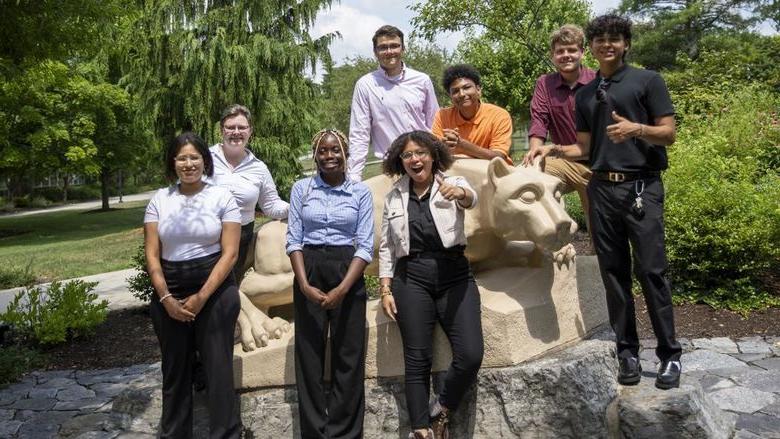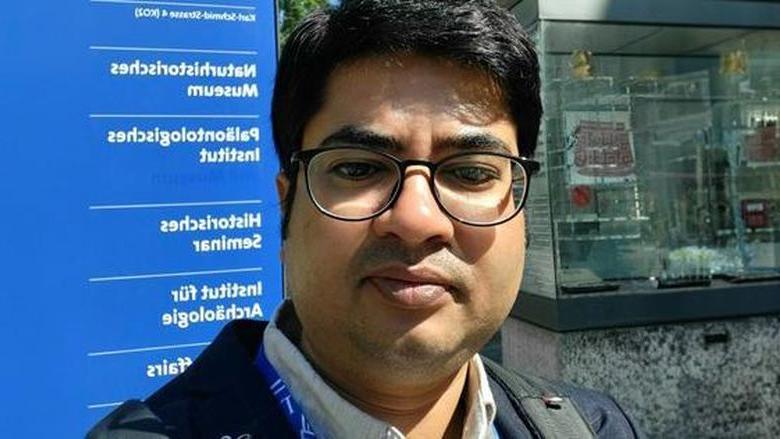
Penn State Berks and Penn State Mont Alto students traveled to Eagle Butte, South Dakota to spend their spring break volunteering with the Cheyenne River Sioux Tribe of the Lakota Nation as part of the University’s Alternative Spring Break (ASB) trips.
WYOMISSING, Pa. — While most students spent their spring break relaxing and enjoying their time off, nine Penn State Berks students dedicated their time to serving a community.
Students from Penn State Berks and Penn State Mont Alto traveled to Eagle Butte, South Dakota, to spend their spring break volunteering with the Cheyenne River Sioux Tribe of the Lakota Nation as part of the University’s Alternative Spring Break (ASB) trips.
Penn State Berks students included:
-
Amar Alford (first-year, Conrow, Texas)
-
Aviana Armstead-Collado (third-year, Erdenheim, Pennsylvania)
-
Kaitelynn Beely (first-year, San Antonio, Texas)
-
Kylie Burkholder (third-year, Ephrata, Pennsylvania)
-
Nicole Eisenhauer (second-year, Pine Brook, New Jersey)
-
Jocelyn Espinoza (second-year, Bloomfield, New Jersey)
-
Amy Najarro Bojorquez (third-year, Greenwich, Connecticut)
-
Johnathan Newnham (first-year, Reading, Pennsylvania)
-
Anne Setenet (third-year, Clifton Heights, Pennsylvania)
Penn State Berks staff TaLisa Ramos, associate director of student affairs, and Lilibell Sanchez, assistant director of student leadership, worked with Jordan Traut, student life coordinator at Mont Alto, to organize the trip. Traut has a connection with a mentor who is a member of the Cheyenne River Sioux Tribe and invited the two campuses to the reservation.
“It felt really nice to see two Penn State campuses come together and make something beautiful out of a week-long trip,” Aviana Armstead-Collado, a third-year psychology major, shared.
Before the trip, Ramos and Sanchez held information sessions for the Berks students attending to teach them the culture and history of the Lakota Sioux nation so that they were prepared with the proper knowledge going into the experience.
“We wanted to make sure that the students who were coming on this trip realized the history that has happened to these people that we’re serving,” Ramos said. “Working with the Lakota Sioux nation, this is a community who has experienced a lot of historical traumas and continues to experience discrimination and oppression in the spaces that they’re in. We talked a lot about the respect that we need to have when we’re talking about the social issues that these individuals are facing and who the people who created these circumstances for them are.”
Students spent the week engaged in activities of learning and service of the Lakota Sioux nation’s culture and history while living on the reservation. Students' volunteer work included working with the Cheyenne River Youth Project, Native Bio Data, Youth Horsemanship Program with the Cheyenne River Game and Fish Parks, the Tribal Council, KIPI Radio Station and 100 Horses Women's Society.
Specifically, some of the service projects included creating decorations for the Cheyenne River Youth Project prom, grooming horses and creating a new handbook that features updated information on them for the Youth Horsemanship Program, and working with scientists at Native Bio Data to research different illnesses present in the water supply.
“The most rewarding part of being a part of these service sites was getting to know the people,” Sanchez said. “They told us about their backgrounds and lives and the struggles they have faced coming from this community.”
In addition to the service, the students had opportunities to immerse themselves in the Cheyenne River Tribe’s culture. Members of the tribe invited them to participate in community events including attending a tribal council meeting, learning traditional Lakota hoop dance and language, and attending the reservation’s high school basketball team’s tournament sendoff.
“One of the biggest takeaways for me was the importance of learning where you came from and who you are — understanding that your family tree is something sacred. This experience reminded me that family is very important,” said Armstead-Collado.
Kaitelynn Beely, a first-year life science major, said this experience taught her the value of human connection. “This trip taught me that we’re all people at the end of the day just trying to help each other have a better life," she said. "It’s important to connect and learn from one another.”
For Anne Setenet, a third-year biology major, learning about a culture different from her own inspired her to join the Alternative Spring Break trip. “I learned to be patient with everything," she said. "One of the Lakota Sioux members taught the kids on the reservation how to stop and focus on one thing at a time, and that really stuck with me.”
Kylie Burkholder, a third-year elementary and early childhood education major, shared that this experience left a lasting impact on her. “I made so many great connections with the people from Penn State Berks and the Lakota community," she said. "The reservation runs a horsemanship program for the youth during the summer, and I hope to go back next summer to help with this.”
About Alternative Spring Break
The Penn State Alternative Breaks program provides opportunities for students to learn more about themselves, others, and the world around them through service. The program offers service trips throughout the academic year including service weekends, fall alternative breaks, alternative winter breaks, and alternative spring breaks. Each program is designed to encourage personal growth and reflection, promote civic engagement around a social issue, and immerse participants in a new community.
For more information, contact TaLisa Ramos at [email protected] or Lilibell Sanchez at [email protected].








